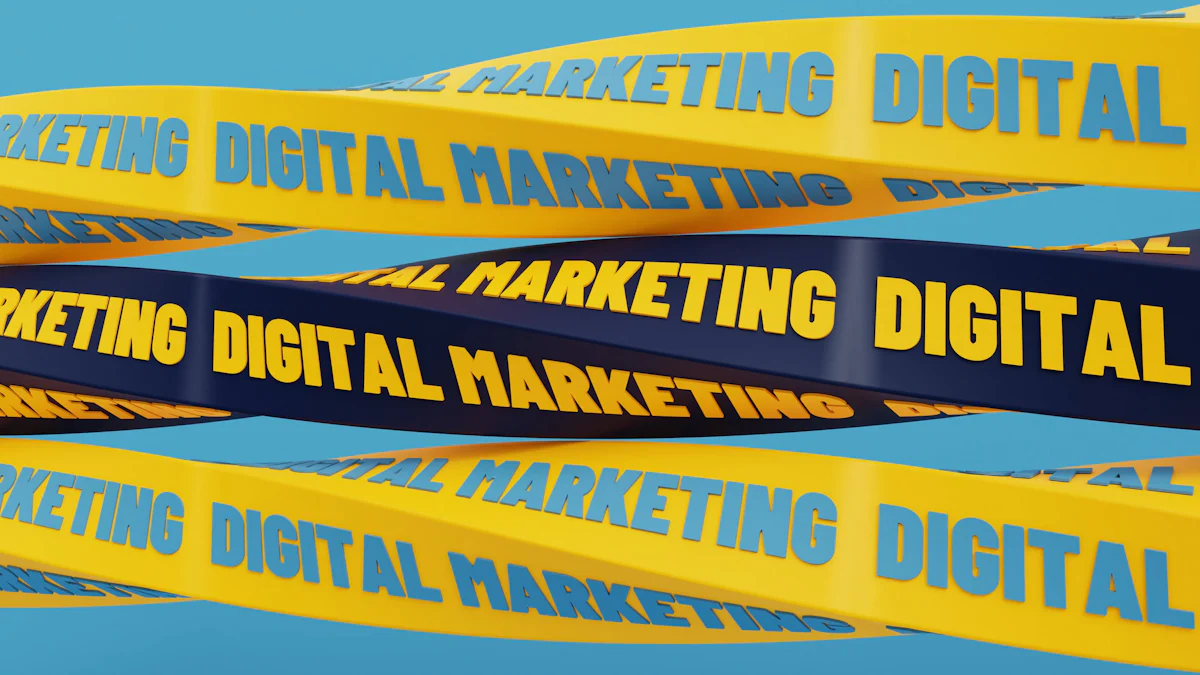Top Influencer Marketing Platforms for E-commerce Success

Choosing the right influencer marketing web platforms can transform your e-commerce business. Influencer marketing has become a powerhouse, with 85% of social media users swayed by influencers' content. This strategy not only boosts brand visibility but also drives sales. With influencer marketing software, you can connect with influencers who resonate with your brand. As 87% of consumers admit to being influenced by such marketing, it's clear that influencers hold the key to reaching new audiences. Embrace ecommerce influencer marketing to elevate your brand and watch your business thrive.
Top Influencer Marketing Platforms

Platform 1: Upfluence
Upfluence stands out as a comprehensive influencer marketing web platform designed to elevate your e-commerce business.
Key Features
- Influencer Discovery: Easily find influencers who align with your brand values and target audience.
- Campaign Management: Streamline your influencer campaigns from start to finish with intuitive tools.
- Payment Processing: Simplify transactions with built-in payment solutions.
- Audience Insights: Gain valuable data to refine your influencer marketing strategy.
Pricing
Upfluence offers flexible pricing plans tailored to your business needs. You can choose from various packages that suit your budget and campaign goals.
Pros and Cons
- Pros: Comprehensive features, user-friendly interface, excellent customer support.
- Cons: Pricing may be high for small businesses, steep learning curve for beginners.
Best Use Cases
Ideal for e-commerce brands looking to boost brand credibility and drive sales through effective influencer collaboration. Use Upfluence to manage large-scale influencer outreach and optimize your influencer marketing strategies.
Platform 2: Aspire
Aspire is another leading influencer marketing platform that empowers e-commerce businesses to connect with the right influencers.
Key Features
- Influencer Recruitment: Discover and recruit top influencers with ease.
- Relationship Management: Build and maintain strong partnerships with influencers.
- Reporting Tools: Access detailed reports to measure campaign success and audience engagement.
Pricing
Aspire provides competitive pricing options, making it accessible for both small and large e-commerce businesses. Custom plans are available to meet specific needs.
Pros and Cons
- Pros: Strong focus on influencer recruitment, robust reporting features, trusted by major brands.
- Cons: Limited integration options, may require additional training for optimal use.
Best Use Cases
Aspire excels in creating authentic influencer collaborations. It's perfect for brands aiming to enhance their ecommerce influencer marketing efforts and achieve measurable results.
Platform 3: Instagram
Instagram remains a powerhouse in the realm of influencer marketing platforms, offering unparalleled reach and engagement.
Key Features
- Visual Content: Leverage high-quality images and videos to captivate your audience.
- Stories and Reels: Utilize these features for dynamic and engaging content.
- Hashtags and Tags: Enhance discoverability and connect with niche audiences.
Pricing
Instagram itself is free to use, but costs arise from influencer fees and advertising. Budget accordingly to maximize your influencer marketing web efforts.
Pros and Cons
- Pros: Massive user base, high engagement rates, versatile content formats.
- Cons: Algorithm changes can affect visibility, competitive landscape.
Best Use Cases
Instagram is ideal for brands seeking to increase audience engagement and visibility. Use it to showcase products and build a loyal community through strategic influencer marketing.
Platform 4: Facebook
Facebook remains a dominant force among influencer marketing platforms, offering vast opportunities for e-commerce businesses to connect with their target audience.
Key Features
- Wide Reach: Access to a massive user base, allowing you to reach diverse demographics.
- Targeted Advertising: Utilize advanced targeting options to ensure your content reaches the right audience.
- Engagement Tools: Leverage features like Facebook Live and Groups to foster audience engagement and build community.
Pricing
Facebook itself is free, but costs arise from influencer fees and advertising expenses. You can set a budget that aligns with your campaign goals, making it flexible for various business sizes.
Pros and Cons
- Pros: Extensive reach, robust targeting capabilities, strong community-building tools.
- Cons: Algorithm changes can impact visibility, competition for attention is high.
Best Use Cases
Facebook excels in building brand credibility and fostering community engagement. It's ideal for brands looking to create meaningful connections with their audience through strategic influencer marketing efforts.
Platform 5: TikTok
TikTok has rapidly emerged as a leading influencer marketing platform, especially popular among younger audiences.
Key Features
- Short-Form Video Content: Engage users with creative and entertaining videos.
- Viral Potential: Tap into trends and challenges to increase visibility.
- Influencer Collaboration: Partner with influencers to create authentic content that resonates with viewers.
Pricing
TikTok is free to use, but influencer fees and advertising costs vary. You can tailor your budget to fit your campaign needs, ensuring cost-effectiveness.
Pros and Cons
- Pros: High engagement rates, potential for viral content, strong appeal to younger demographics.
- Cons: Rapidly changing trends, requires creativity to stand out.
Best Use Cases
TikTok is perfect for brands aiming to boost ecommerce influencer marketing efforts by reaching younger audiences. Use it to showcase products in a fun and engaging way, driving both visibility and sales.
How to Choose the Right Platform

Selecting the right influencer marketing platform can significantly impact your e-commerce success. With numerous options available, it's essential to evaluate each platform based on your specific needs and goals. Here's how you can make an informed decision:
Assessing Your E-commerce Needs
Begin by identifying your e-commerce business objectives. Are you looking to increase brand visibility, drive sales, or enhance audience engagement? Understanding your goals will help you determine which platform aligns best with your needs. For instance, if your target audience consists of younger demographics, TikTok might be an ideal choice due to its vibrant and youthful user base. On the other hand, if you aim to build brand credibility and foster community engagement, Facebook offers robust tools for connecting with diverse audiences.
Comparing Features and Pricing
Once you've identified your needs, compare the features and pricing of different platforms. Look for key features such as influencer discovery, campaign management, and audience insights. Upfluence and Aspire provide comprehensive influencer marketing software with advanced features tailored for e-commerce businesses. Consider the pricing structure as well. Some platforms offer flexible plans, while others may require a more significant investment. Ensure that the platform you choose provides value for money and aligns with your budget.
Evaluating Ease of Use and Support
Ease of use is crucial when selecting an influencer marketing web platform. A user-friendly interface can streamline your influencer outreach efforts and save you time. Additionally, consider the level of customer support offered by the platform. Reliable support can assist you in navigating any challenges you may encounter. Platforms like Upfluence are known for their excellent customer support, making them a reliable choice for businesses new to influencer marketing.
By carefully assessing your e-commerce needs, comparing features and pricing, and evaluating ease of use and support, you can choose the right influencer marketing platform to elevate your brand and achieve your business goals.
Considering Integration with Existing Tools
When selecting an influencer marketing platform, you must consider how well it integrates with your existing tools. Seamless integration can streamline your workflow and enhance efficiency. Here are some key points to consider:
-
Compatibility with E-commerce Platforms: Ensure the influencer marketing platform you choose can easily connect with your e-commerce platform. This integration allows for smooth data transfer and helps you track sales generated through influencer campaigns. Platforms like Upfluence and Aspire often offer integrations with popular e-commerce systems, making them ideal for e-commerce businesses.
-
Social Media Synchronization: Your chosen platform should sync effortlessly with social media channels where influencers operate. For instance, Facebook and TikTok are pivotal in influencer marketing. Facebook's vast reach and TikTok's appeal to younger audiences make them essential for audience engagement. Ensure your platform supports these networks to maximize your campaign's reach.
-
CRM and Analytics Tools: Integrating with CRM systems and analytics tools can provide valuable insights into your influencer marketing efforts. This integration helps you manage influencer relationships and measure campaign success. Look for platforms that offer robust analytics features and can connect with your existing CRM software.
-
Ease of Use: The integration process should be straightforward. Complicated setups can lead to inefficiencies and frustration. Choose a platform known for its user-friendly interface and reliable customer support to assist with any integration challenges.
By considering these factors, you can select an influencer marketing platform that not only meets your needs but also enhances your overall marketing strategy. This thoughtful approach ensures you leverage influencers effectively, driving success for your e-commerce business.
Choosing the right influencer marketing platform can transform your e-commerce strategy. Each platform offers unique features, from Upfluence's comprehensive tools to TikTok's viral potential. Consider your brand's needs and goals. Explore platforms like Aspire for long-term influencer relationships or Instagram for visual engagement. Remember, the right platform will help you connect with influencers who resonate with your audience. Dive deeper into these options and select the one that aligns with your business objectives. By doing so, you can harness the power of influencers to elevate your brand and drive success.
FAQ
What is an influencer marketing platform?
An influencer marketing platform helps you connect with influencers who can promote your brand. These platforms streamline the process of finding, managing, and analyzing influencer campaigns. They offer tools to discover influencers that align with your brand values and target audience. Platforms like Upfluence and Aspire integrate with e-commerce systems such as Shopify, making it easier to manage influencer relationships and track campaign success.
How do I choose the right influencer marketing platform for my e-commerce business?
To choose the right platform, assess your business needs. Determine your goals, such as increasing brand visibility or driving sales. Compare features and pricing of different platforms. Look for key features like influencer discovery and campaign management. Consider ease of use and customer support. Platforms like Upfluence and Aspire offer comprehensive tools tailored for e-commerce businesses.
Can influencer marketing platforms integrate with my existing e-commerce tools?
Yes, many influencer marketing platforms integrate seamlessly with e-commerce tools. For example, Upfluence and Aspire connect with platforms like Shopify and WooCommerce. This integration allows for smooth data transfer and helps you track sales generated through influencer campaigns. Ensure the platform you choose supports integration with your existing tools for a streamlined workflow.
What are the benefits of using influencer marketing for e-commerce?
Influencer marketing can significantly boost your e-commerce success. It enhances brand visibility and credibility. Influencers help you reach new audiences and build trust with potential customers. By collaborating with influencers, you can drive sales and increase engagement. Platforms like Instagram and TikTok offer vast opportunities for reaching diverse demographics and creating engaging content.
How do influencers impact consumer behavior?
Influencers have a strong impact on consumer behavior. They build trust with their audience by sharing authentic experiences and recommendations. Consumers often rely on influencers' opinions when making purchasing decisions. By partnering with influencers, you can tap into their loyal following and influence potential customers to choose your products.
What are the costs associated with influencer marketing platforms?
The costs vary depending on the platform and your campaign needs. Some platforms, like Instagram and Facebook, are free to use, but you may incur costs from influencer fees and advertising. Platforms like Upfluence and Aspire offer flexible pricing plans tailored to your business needs. Consider your budget and campaign goals when choosing a platform.
How can I measure the success of my influencer marketing campaigns?
You can measure success through various metrics. Track engagement rates, such as likes, comments, and shares. Monitor website traffic and sales generated from influencer campaigns. Use analytics tools provided by platforms like Upfluence and Aspire to gain insights into audience behavior and campaign performance. These metrics help you refine your strategy and achieve better results.
Are there any challenges in influencer marketing?
Yes, influencer marketing comes with challenges. Finding the right influencers who align with your brand can be time-consuming. Managing relationships and ensuring authentic collaborations require effort. Algorithm changes on platforms like Instagram and Facebook can affect visibility. However, with the right platform and strategy, you can overcome these challenges and achieve success.
How do I ensure authentic collaborations with influencers?
To ensure authenticity, choose influencers who genuinely resonate with your brand. Build strong relationships by maintaining open communication and setting clear expectations. Encourage influencers to share their honest experiences with your products. Platforms like Aspire focus on building lasting partnerships, helping you create authentic collaborations that resonate with audiences.
What trends should I watch in influencer marketing?
Stay updated on trends like short-form video content and live streaming. Platforms like TikTok and Instagram Reels offer opportunities for creative and engaging content. Influencers increasingly focus on niche markets, allowing brands to reach specific audiences. Keep an eye on emerging platforms and technologies to stay ahead in the influencer marketing landscape.
See Also
15 Essential Influencer Marketing Platforms for 2024
Key Influencer Marketing Trends to Follow in 2024
Comprehensive Guide to Choosing the Right Influencer Platform
